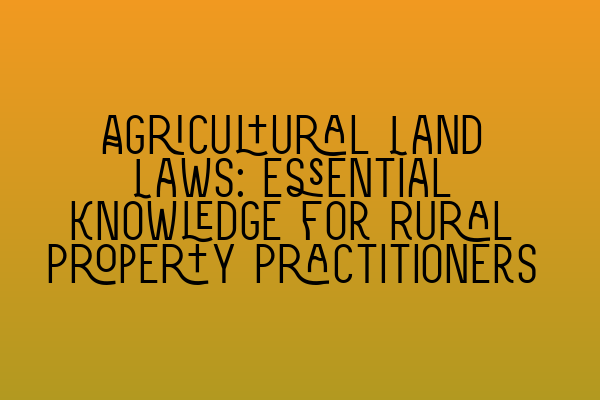Agricultural Land Laws: Essential Knowledge for Rural Property Practitioners
Welcome to SQE Property Law & Land Law, your trusted solicitors specializing in rural property matters. In today’s blog post, we will be discussing the essential knowledge that rural property practitioners must have regarding agricultural land laws. Whether you are a solicitor, property owner, or simply interested in the legal aspects of rural land, this article is for you.
Understanding Agricultural Land Laws
Agricultural land laws govern the ownership, transfer, use, and management of land primarily used for agricultural purposes. These laws aim to protect both the rights of landowners and the agricultural sector as a whole. It is crucial for rural property practitioners to be well-versed in agricultural land laws to provide effective legal advice and ensure compliance with regulations.
Key Considerations for Rural Property Practitioners
1. SRA SQE Exam Dates: As a rural property practitioner, it is essential to stay up-to-date with the latest academic and professional qualifications. The SRA SQE exam dates will help you plan your study and preparation schedule effectively.
2. SQE 1 Preparation Courses: Familiarize yourself with the content and format of the SQE 1 exam, which covers foundational legal knowledge. SQE 1 preparation courses can provide you with the necessary materials and guidance to succeed in this exam.
3. SQE 2 Preparation Courses: For advanced legal skills, including property law and land law, consider enrolling in SQE 2 preparation courses. These courses will equip you with the knowledge and expertise required for rural property practice.
Important Concepts in Agricultural Land Laws
Rural property practitioners should be familiar with the following key concepts:
- 1. Agricultural Holdings Act: This legislation governs the relationship between agricultural landlords and tenants, including matters related to tenancy agreements, rent, repairs, and dispute resolution.
- 2. Agricultural Tenancies Act: Provides regulations and guidance on various types of agricultural tenancies, such as Farm Business Tenancies (FBTs) and Agricultural Holdings Act (AHAs).
- 3. Common Agricultural Policy (CAP): A European Union (EU) policy that provides financial support and regulations for agriculture, including subsidies, environmental schemes, and cross-compliance.
- 4. Farm Business Tenancies (FBTs): These tenancies were introduced under the Agricultural Tenancies Act 1995 and offer more flexible arrangements for agricultural landlords and tenants.
- 5. Rights of Way: Understanding the laws surrounding public and private rights of way is crucial, as this can affect access to agricultural land and the rights of neighboring landowners.
Conclusion
As a rural property practitioner, having a thorough understanding of agricultural land laws is vital for providing effective legal advice to clients and ensuring compliance with regulations. Staying up-to-date with SRA SQE exam dates and enrolling in SQE 1 and SQE 2 preparation courses can help you build the necessary knowledge and skills. To learn more, be sure to check out our related articles:
